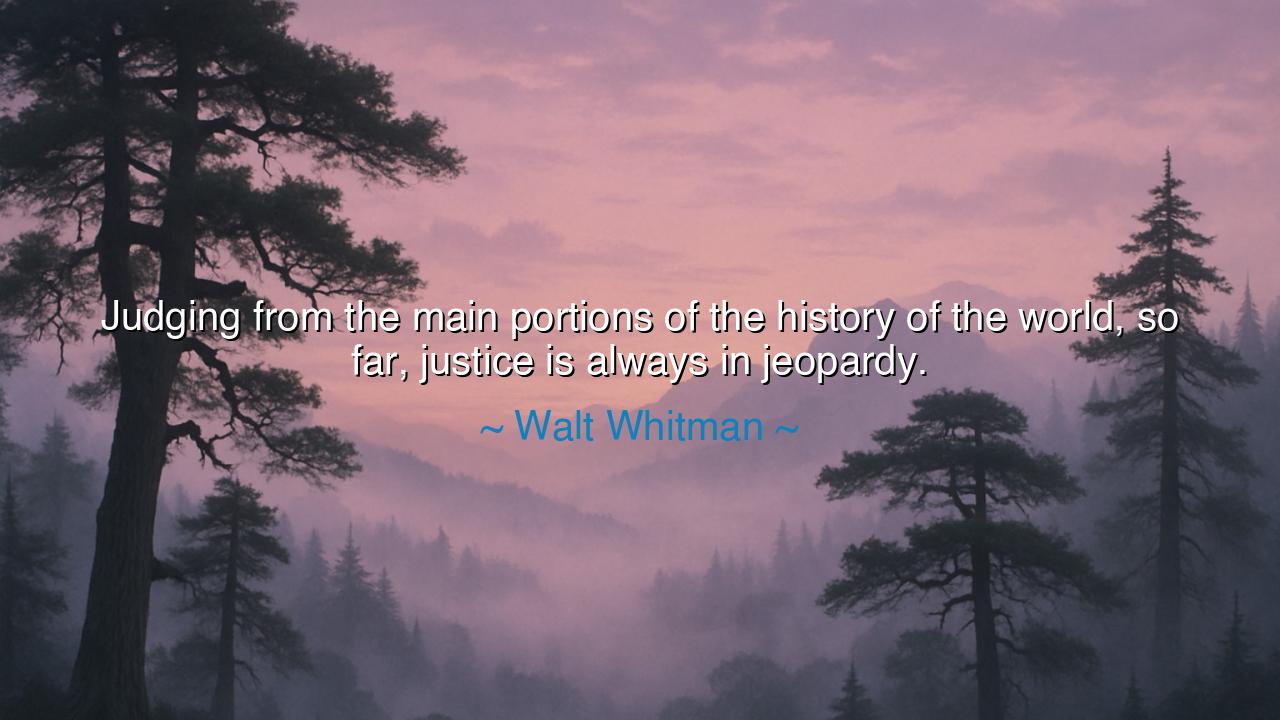
Judging from the main portions of the history of the world, so
Judging from the main portions of the history of the world, so far, justice is always in jeopardy.






“Judging from the main portions of the history of the world, so far, justice is always in jeopardy.” — Thus spoke Walt Whitman, the great bard of America, whose heart was vast enough to hold both the beauty and the sorrow of humankind. His words resound like a bell across the centuries — not of despair, but of solemn vigilance. For in this truth he names a reality older than nations and as enduring as time itself: that justice, that fragile light of human civilization, is forever in danger, forever trembling beneath the weight of greed, pride, and power.
Whitman was no stranger to the contradictions of his age. He lived through the birth of a nation and the agony of its civil war. He saw the promises of liberty shadowed by slavery, the songs of democracy drowned in the cries of the oppressed. And thus, with eyes unblinded by idealism, he wrote that justice is always in jeopardy — not because it is weak, but because it must constantly struggle against the darker elements of the human heart. The poet, standing as a prophet of conscience, saw that every generation must fight anew to defend what is right, for injustice never sleeps, and tyranny never ceases to whisper in the corridors of power.
To say that justice is always in jeopardy is to say that righteousness is not self-sustaining. It requires guardians — men and women of courage who will defend it when others turn away. History itself bears witness to this endless struggle. In the courts of ancient Athens, Socrates was condemned for speaking truth to complacency. In Rome, justice bowed before ambition, and the republic fell to the will of emperors. In every era, the same pattern repeats: when comfort grows, conscience fades; when wealth expands, mercy contracts. Thus, Whitman’s lament becomes an eternal warning — that humanity’s noblest virtue must forever be protected by vigilance, or it will vanish into the silence of indifference.
Consider, too, the story of Martin Luther King Jr., who walked the long road of justice in modern times. He faced not foreign tyrants but the quiet cruelty of laws built on centuries of prejudice. He marched, he spoke, he suffered — and though his life was taken, his voice remains as proof that justice must be pursued even when it seems beyond reach. For like fire, justice can never be permanent; it must be kindled anew in every heart. Whitman’s words live in King’s example, teaching us that the path of righteousness is never a single victory, but a ceaseless journey — one that demands sacrifice, hope, and faith in the unseen good.
Whitman’s insight also unveils a deeper, more spiritual truth: that justice is not a condition of the world, but a calling of the soul. The world is imperfect because humanity itself is imperfect — divided by desire, fear, and the hunger for power. Yet it is precisely because justice is so endangered that it becomes sacred. Its rarity makes it precious, its fragility makes it divine. Each act of fairness, each defense of the weak, each truth spoken against corruption — these are the small flames that keep the great light alive. When Whitman wrote that justice is always in jeopardy, he did not counsel despair, but rather summoned courage: for if the danger is eternal, so too must be our duty.
Through his poetic gaze, Whitman reminds us that the story of humanity is the story of this battle — between compassion and cruelty, freedom and domination, truth and deceit. Empires may fall, revolutions may rise, but the peril to justice remains constant, like a shadow cast by human nature itself. And yet, in that constancy lies our test and our meaning. For if justice were easy, it would not be noble. Its jeopardy gives birth to heroes, and its uncertainty calls forth the best within us.
Let this be your lesson, then: never grow weary in defending what is right. Do not wait for peace or prosperity to stand for truth, for it is in times of comfort that justice most often begins to decay. Question authority; speak for the voiceless; let fairness guide your steps even when it costs you dearly. For history’s judgment does not fall upon those who succeed, but upon those who dared to act.
And so remember, as Walt Whitman teaches, that justice will always be in jeopardy — and that is why it always needs you. The hands of history are not written by fate, but by the living choices of mortal hearts. Be among those who guard the light, even as the darkness gathers. For though the struggle is unending, every act of justice — however small — pushes back the shadow, and in that defiance, humanity finds its truest glory.






AAdministratorAdministrator
Welcome, honored guests. Please leave a comment, we will respond soon